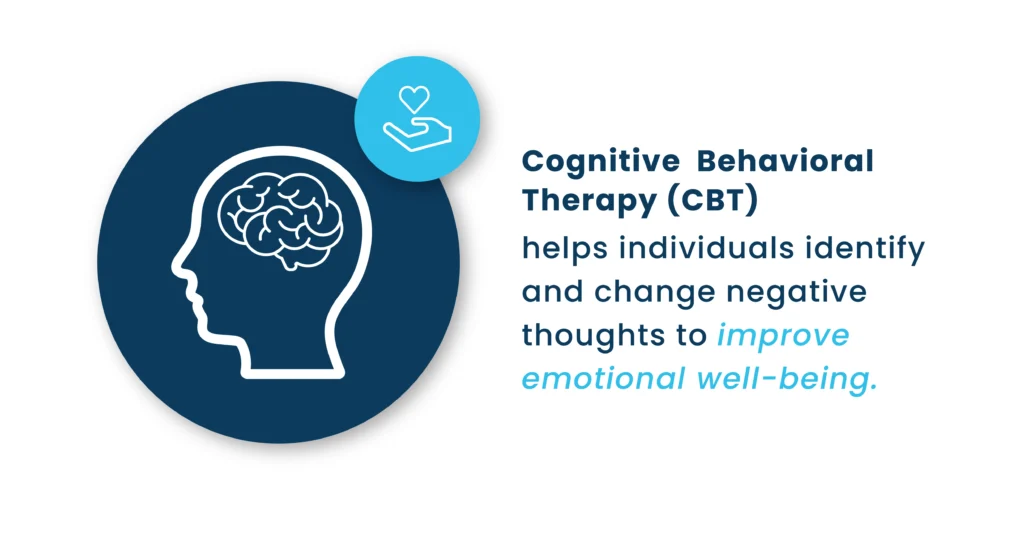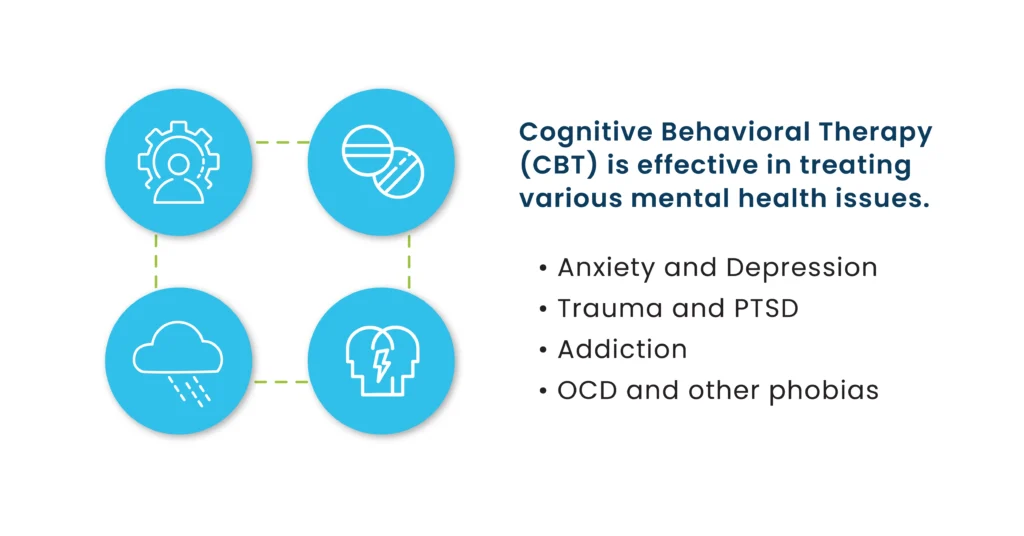Choose your Language:
Cognitive behavioral therapy (CBT) is a proven and effective treatment for various mental health challenges. CBT helps individuals understand and alter negative thought patterns that affect emotional well-being by focusing on the connection between thoughts, feelings, and behaviors.
In this blog, we will guide you through the recovery steps with CBT, highlighting its essential techniques and core principles. Whether you’re dealing with anxiety, depression, or addiction, CBT offers practical tools to help you change harmful thought patterns and regain control over your life and mental health.
Key Takeaways
Cognitive behavioral therapy helps identify and change negative thought patterns to improve emotional well-being. Here’s what you need to know:
- CBT uses cognitive restructuring, exposure therapy, and journaling to promote healthier behaviors.
- CBT effectively treats anxiety, depression, trauma, PTSD, addiction, and other mental health challenges.
- CBT offers lasting benefits by building resilience, problem-solving skills, and improved emotional health.
The Haven Detox-Arizona offers cognitive behavioral therapy to help you overcome mental health issues and addictive behavior. Dial (520) 525-1252 for details.

What Is Cognitive Behavioral Therapy?
Cognitive behavioral therapy (CBT) is a mental health treatment that focuses on thoughts, feelings, and behaviors. It helps people identify negative thought patterns that affect their emotions and actions. By changing these patterns, CBT supports healthier coping mechanisms, improving mental well-being and effectively managing challenges like anxiety, depression, and stress.
Core Principles Of CBT
CBT is based on understanding how thoughts, feelings, and actions connect. It teaches individuals to identify and replace harmful thinking patterns with positive alternatives. The therapy emphasizes practical skills, encouraging people to solve problems and achieve better emotional balance in everyday situations.
How CBT Works
Cognitive Behavioral Therapy (CBT) helps manage mental health and addiction issues. It focuses on identifying and changing harmful thought patterns and behaviors. CBT empowers individuals to regain control over their lives and achieve lasting recovery by teaching coping strategies and promoting healthier habits.
Identifying Problematic Thoughts
CBT starts by helping individuals recognize harmful or unhelpful thoughts. Therapists guide clients in pinpointing beliefs causing distress or unhealthy behaviors. This self-awareness builds a foundation for understanding emotional triggers and creating effective coping mechanisms.
Replacing Negative Patterns With Positive Plans
CBT encourages replacing harmful thoughts and habits with healthier alternatives. Therapists teach skills like reframing negative beliefs and practicing mindfulness. These techniques promote emotional stability and support long-term recovery from mental health challenges and addiction.
Collaborative Nature Of CBT
CBT thrives on collaboration between therapists and clients for effective treatment. They work together to set achievable goals and track progress. This teamwork fosters trust and ensures therapy aligns with individual needs, making recovery more personalized and successful.
Conditions Treated With CBT
Cognitive behavioral therapy (CBT) is effective in treating various mental health issues. It helps individuals identify and change negative thought patterns. CBT can treat anxiety, depression, trauma, PTSD, addiction, and other mental health challenges, improving overall well-being.

Anxiety And Depression
CBT helps manage anxiety and depression by challenging negative thoughts. It teaches individuals to reframe distorted thinking patterns. This therapy also focuses on developing healthy coping strategies to reduce symptoms and improve emotional well-being.
Trauma And PTSD
CBT is effective for trauma and PTSD, focusing on processing painful memories. It helps individuals confront and reframe their traumatic experiences. This approach empowers individuals to develop healthier responses to stress and anxiety related to past trauma.
Other Mental Health Issues
CBT is also helpful for treating various other mental health conditions. It can help with disorders like OCD, phobias, and eating disorders. CBT’s goal is to identify and change harmful thoughts and behaviors, improving mental health and daily functioning.
Addiction
CBT plays a crucial role in addiction treatment by changing unhealthy behaviors. It helps individuals recognize triggers and develop strategies to avoid relapse. CBT encourages healthier coping skills, contributing to long-term recovery from substance abuse.
Techniques And Tools Used In CBT
Cognitive behavioral therapy (CBT) uses various techniques to help people manage thoughts and behaviors. These tools are designed to change negative thinking patterns and improve emotional responses. CBT allows individuals to develop healthier thinking habits, leading to positive behavior and emotional well-being changes.
Cognitive Restructuring
Cognitive restructuring involves identifying and challenging negative thought patterns. It helps individuals replace irrational or harmful beliefs with more realistic and balanced thoughts. This process reduces stress and negative emotions, promoting healthier thought patterns and improved mental well-being.
Exposure Therapy
Exposure therapy helps people confront fears or anxieties in a controlled environment. By gradually exposing individuals to feared situations, they can learn that their fears are often exaggerated or irrational. This technique builds confidence and reduces avoidance behaviors, decreasing anxiety over time.
Journaling And Thought Records
Journaling and thought records help track and analyze negative thoughts. By writing down emotions and thought patterns, individuals can identify triggers and distortions in their thinking. This self-reflection aids in challenging harmful beliefs and replacing them with more positive, constructive alternatives.
Behavioral Experiments
Behavioral experiments test beliefs and assumptions through real-life experiences. These experiments help individuals see whether their negative predictions or fears are accurate. By conducting these tests, people gain insight and confidence, leading to changes in their behavior and reduced distress.
Benefits Of Cognitive Behavioral Therapy
Cognitive behavioral therapy (CBT) helps individuals manage negative thoughts and teaches coping strategies for stress and anxiety. It empowers individuals to improve mental well-being by changing harmful thought patterns and behaviors, leading to better emotional health.
Practical And Goal-Oriented
CBT is focused on setting clear, achievable goals. It encourages individuals to take practical steps to manage their mental health. By focusing on real-life challenges, CBT helps individuals develop skills to cope with daily stressors and improve overall functioning.
Evidence-Based Effectiveness
CBT is backed by scientific research that has proven its success. Studies show it is effective for treating depression, anxiety, and more. Its structured approach has been tested and proven to create lasting changes in mental health, making it a reliable treatment option.
Long-Term Positive Outcomes
CBT leads to lasting benefits, even after treatment ends. It helps individuals build resilience and improve problem-solving skills. Many people report maintaining the positive changes learned in CBT, leading to improved emotional health and reduced risk of future mental health issues.
What To Expect In A CBT Session
You can expect to talk openly with a therapist in a CBT session. The therapist will help you identify and understand your thoughts and feelings. They will also work with you to change negative patterns that affect your behavior.
Each session often involves working on specific issues or goals. CBT uses practical exercises to help you develop healthier ways of thinking. The therapist guides you through these exercises so you can practice them at home.
The sessions usually involve setting realistic goals and tracking progress. The therapist may encourage you to keep a journal to track your thoughts. Over time, you will learn how to apply these skills in everyday situations.
Find Healing At The Haven Detox-Arizona
If you are struggling with mental health challenges or addiction, cognitive behavioral therapy (CBT) can guide you toward recovery.
At The Haven Detox-Arizona, we offer this evidence-based therapy as part of our comprehensive residential rehab program. CBT helps you identify and change negative thought patterns, fostering emotional balance and resilience. In our residential setting, you’ll receive personalized care learning practical tools to manage anxiety, depression, and addiction triggers.
Take the first step toward a healthier life—call us at (520) 525-1252 to start your journey today!




